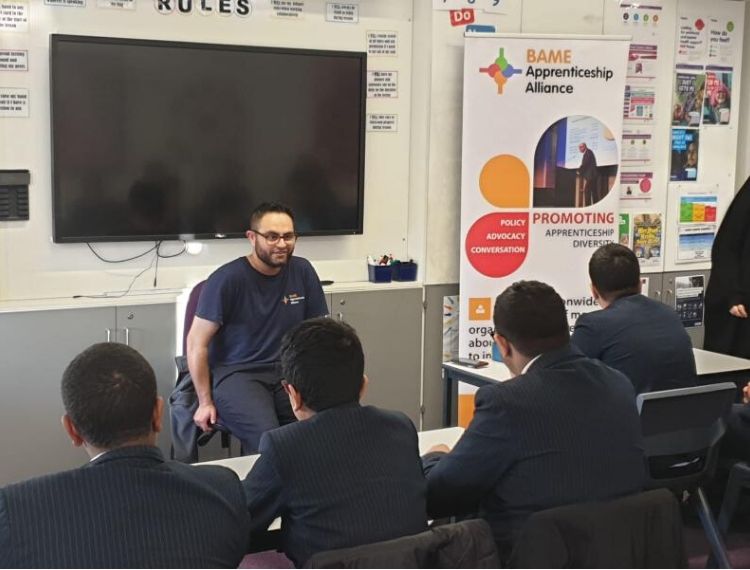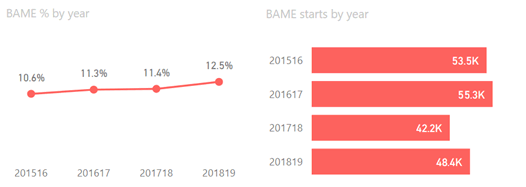Making apprenticeships count for disadvantaged communities in the COVID-19 new normal

If someone was to say in January that the country (and the world for that matter) would shut down, there would be mass unemployment and we would be facing both a health and economic crisis, then you’d agree that it would have to have been unprecedented.
So here we are on day 85 and it’s got me thinking about all our preparations that we were making for this year, all the plans we made that were then halted in March.
This year was supposed to be a big year for apprenticeships. In 2015, when the then Business Secretary Sajid Javid launched the Government’s masterplan for apprenticeships, ambitious targets were set to see 3 million apprenticeship starts by 2020.
Within this as many know, the government also set a target of increasing BAME (black, asian and minority ethnic) representation by 20% by 2020. This was to be aided by the introduction of the apprenticeship levy to drive growth in apprenticeship numbers, particularly from large employers.
Fast forward a few years and how have we done?
In short, BAME proportions have increased since the levy reforms, but this has not been consistent across all elements of the group. The proportion of BAME starts has been increasing through time; but this has been of a smaller programme – with BAME volumes decreasing since the levy reforms by c10% (compared to 25% for starts by White apprentices).

Now midway through 2020, in the midst of a severe economic recession and a health crisis, the scale of the impact is becoming apparent. According to research by the learning and work institute, ‘one in three working-age adults is either unemployed, furloughed or receiving income support for the self-employed’, wiping out a five year employment gain in a single month. This could mean up to 4.5 million people unemployed once the chancellor’s support ends.
However, what’s more striking is the impact on young people.
Firstly on apprentices, according to the Sutton Trust research on impact of coronavirus on apprenticeships, up to 61% of apprentices have lost out on valuable work experience or learning as a result of the pandemic with one in 13 being made redundant.
Then there’s those who will be entering the labour market after full time education. 600,000 young people will face a disrupted education system, a weaker labour market and a reduction in advertised roles.
Beneath these figures is the significant impact it will have on disadvantaged communities, particularly those from BAME backgrounds.
Over the last few years with the small but significant rise in apprentices from BAME backgrounds, we have heard and seen the impact apprenticeships have on the apprentices and their families, their companies and the local and national economy.
We already know that apprenticeships have a significant impact on the economy – apprenticeships were a significant aid in recovering from the financial crash in 2008/09 to meet the skills needed then.
Right now, having access to an apprenticeship is all the more imperative. Prior to the coronavirus, we were on the verge of apprenticeships becoming a valid and valuable alternative to traditional further education seen within BAME communities. We saw companies increasing representation of the workforce to reflect the communities and customers they serve, ultimately boosting their economic prosperity. And we saw a reduction of youth unemployment from BAME communities.
Apprenticeships and the support services attached have been a key driver for social mobility within deprived communities and it is really important for the Government to continue supporting apprenticeships for BAME communities and the support services to ensure that no young person is left behind.
I recently supported the letter to the Prime Minister for the Opportunity Guarantee which looks at promoting job creation by reducing costs and barriers for employers hiring, increasing careers service capacity and securing opportunities for all young people after full time education.
We, along with 200 other orgs, have signed an open letter to @BorisJohnson calling on @10DowningStreet to deliver an #opportunityguarantee to tackle @ONS‘s unemployment figures.
Read the full letter here ▶️ https://t.co/d3AYGQoiHo pic.twitter.com/BvRq2MXOL0
— Create Jobs (@Create_Jobs) June 15, 2020
However, I wanted to extend this further by sharing further recommendations for Government to:
- Continue investment into the Five Cities project which supports BAME communities in building awareness of apprenticeships and bridges gaps with employers
- Incentivise employers to increase outreach into BAME communities with focus on local communities
- Incentivise local organisations to build capacity for youth employment services, mental health, financial education services for BAME youth
- Regenerate focus on 16-18 year old for apprenticeships
BAME communities are in desperate need of support to increase household prosperity and with the recommendations above, we will be able to kickstart the economy for recovery and growth for the disadvantaged.
Isa Mutlib is the CEO of The BAME Apprenticeship Alliance – a community of organisations that aims to promote apprenticeship diversity through policy, advocacy and conversations.
Isa is also the founder of The Apprenticeship Hack, a workforce edtech where organisations can build a foundation to their own equality, diversity and inclusion through empowering their apprentices.











Responses